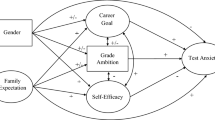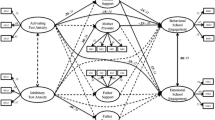Abstract
This exploratory study aims to reveal how impostor feelings and general self-efficacy co-explain students’ test-anxiety and academic achievements, while testing the possible preceding effect of maternal psychological control using the students’ recollections of their mothers. The study’s sample comprised 142 students at several academic institutions in Israel, whose age ranges from 20 to 52 (Mage = 27.53, SD = 5.61). The results of a path model testing the direct and indirect associations between these variables yielded three main findings: First, students’ impostor feelings and self-efficacy were inversely intercorrelated, while, when taken together, only the former was uniquely associated with test-anxiety (i.e., in a positive direction). This finding is among the first that empirically confirms the association between the two phenomena in students. The association between self-efficacy and test-anxiety was fully mediated by the students’ impostor feelings. Second, maternal psychological control was negatively and positively associated with the students’ self-efficacy and impostor feelings (respectively). The latter, in turn, significantly mediated the maternal effect on the students’ test-anxiety. Finally, test-anxiety and self-efficacy were inversely related to the students’ academic achievements (i.e., in opposite directions). Test-anxiety fully mediated the negative association between the students’ impostor feelings and their academic achievements. The importance and novelty of the findings are discussed in light of the background literature, while specifying the directions for further research.


Similar content being viewed by others
Availability of data and material
Not applicable.
Not applicable.
References
Aldhafri, S. S., Alrajhi, M. N., Alkharusi, H. A., Al-Harthy, I. S., Al-Barashdi, H. S., & Alhadabi, A. S. (2020). Parenting styles and academic self-efficacy beliefs of Omani School and University students. Education Sciences, 10(9), 229. https://doi.org/10.3390/educsci10090229
Bandura, A. (1988). Self-efficacy conception of anxiety. Anxiety research, 1(2), 77–98. https://doi.org/10.1080/10615808808248222
Barber, B. K. (1996). Parental psychological control: Revisiting a neglected construct. Child Development, 67(6), 3296–3319. https://doi.org/10.1111/j.1467-8624.1996.tb01915.x
Barber, B. K., Xia, M., Olsen, J. A., McNeely, C. A., & Bose, K. (2012). Feeling disrespected by parents: Refining the measurement and understanding of psychological control. Journal of Adolescence, 35(2), 273–287. https://doi.org/10.1016/j.adolescence.2011.10.010
Bonaccio, S., & Reeve, C. L. (2010). The nature and relative importance of students’ perceptions of the sources of test anxiety. Learning and Individual Differences, 20(6), 617–625. https://doi.org/10.1016/j.lindif.2010.09.007
Brauer, K., & Wolf, A. (2016). Validation of the German-language Clance Impostor Phenomenon Scale (GCIPS). Personality and Individual Differences, 102, 153–158. https://doi.org/10.1016/j.paid.2016.06.071
Bravata, D. M., Watts, S. A., Keefer, A. L., Madhusudhan, D. K., Taylor, K. T., Clark, D. M., & Hagg, H. K. (2020). Prevalence, predictors, and treatment of impostor syndrome: a systematic review. Journal of General Internal Medicine, 35(4), 1252–1275. https://doi.org/10.1007/s11606-019-05364-1
Chen, G., Gully, S. M., & Eden, D. (2001). Validation of a new general self-efficacy scale. Organizational research methods, 4(1), 62–83. https://doi.org/10.1177/109442810141004
Clance, P. R. (1985). The impostor phenomenon: Overcoming the fear that haunts your success, 209. Atlanta, GA: Peachtree Publishers
Clance, P. R., & Imes, S. A. (1978). The imposter phenomenon in high achieving women: Dynamics and therapeutic intervention. Psychotherapy: Theory Research & Practice, 15(3), 241–247. https://doi.org/10.1037/h0086006
Clance, P. R., & OToole, M. A. (1987). The imposter phenomenon: An internal barrier to empowerment and achievement. Women & Therapy, 6(3), 51–64. https://doi.org/10.1300/J015V06N03_05
Chyung, Y. J., Lee, Y. A., Ahn, S. J., & Bang, H. S. (2022). Associations of perceived parental psychological control with depression, anxiety in children and adolescents: A meta-analysis. Marriage & Family Review, 58(2), 158-197. https://doi.org/10.1080/01494929.2021.1941496
Cokley, K., Awad, G., Smith, L., Jackson, S., Awosogba, O., Hurst, A., & Roberts, D. (2015). The roles of gender stigma consciousness, impostor phenomenon and academic self-concept in the academic outcomes of women and men. Sex Roles, 73(9–10), 414–426. https://doi.org/10.1007/s11199-015-0516-7
Dan, O., & Raz, S. (2015). The relationships among ADHD, self-esteem, and test anxiety in young adults. Journal of attention disorders, 19(3), 231–239. https://doi.org/10.1177/1087054712454571
Embse, N. V. D., & Hasson, R. (2012). Test anxiety and high-stakes test performance between school settings: Implications for educators. Preventing School Failure: Alternative Education for Children and Youth, 56(3), 180–187. https://doi.org/10.1080/1045988X.2011.633285
Enright, M., Baldo, T. D., & Wykes, S. D. (2000). The efficacy of eye movement desensitization and reprocessing therapy technique in the treatment of test anxiety of college students. Journal of College Counseling, 3(1), 36–48. https://doi.org/10.1002/j.2161-1882.2000.tb00162.x
Ergene, T. (2003). Effective interventions on test anxiety reduction: A meta-analysis. School psychology international, 24(3), 313–328. https://doi.org/10.1177/01430343030243004
Friedman, I. A., & Bendas-Jacob, O. (1997). Measuring perceived test anxiety in adolescents: A self-report scale. Educational and Psychological Measurement, 57(6), 1035–1046. https://doi.org/10.1177/0013164497057006012
Haverson, C. E. (1988). Remembering your parents: Reflections on the retrospective method. Journal of Personality, 56(2), 435–443. https://doi.org/10.1111/j.1467-6494.1988.tb00895.x
Honicke, T., & Broadbent, J. (2016). The influence of academic self-efficacy on academic performance: A systematic review. Educational Research Review, 17, 63–84. https://doi.org/10.1016/j.edurev.2015.11.002
Hutchins, H. M., Penney, L. M., & Sublett, L. W. (2018). What imposters risk at work: Exploring imposter phenomenon, stress coping, and job outcomes. Human Resource Development Quarterly, 29(1), 31–48. https://doi.org/10.1080/03075079.2019.1568976
Jöstl, G., Bergsmann, E., Lüftenegger, M., Schober, B., & Spiel, C. (2015). When will they blow my cover? Zeitschrift für Psychologie, 220(2), 109–120. https://doi.org/10.1027/2151-2604/a000102
Krispenz, A., Gort, C., Schültke, L., & Dickhäuser, O. (2019). How to reduce test anxiety and academic procrastination through inquiry of cognitive appraisals: A pilot study investigating the role of academic self-efficacy. Frontiers in psychology, 1917. https://doi.org/10.3389/fpsyg.2019.01917
Lowe, P. A., Lee, S. W., Witteborg, K. M., Prichard, K. W., Luhr, M. E., Cullinan, C. M., & Janik, M. (2008). The test anxiety inventory for children and adolescents (TAICA) examination of the psychometric properties of a new multidimensional measure of test anxiety among elementary and secondary school students. Journal of Psychoeducational Assessment, 26(3), 215–230. https://doi.org/10.1177/0734282907303760
Lowe, P. A., & Lee, S. W. (2007). Factor structure of the test anxiety inventory for children and adolescents (TAICA) scores across gender among students in elementary and secondary school settings. Journal of Psychoeducational Assessment, 26, 231–246. https://doi.org/10.1177/0734282907303773
Mak, K. K., Kleitman, S., & Abbott, M. J. (2019). Impostor phenomenon measurement scales: A systematic review. Frontiers in Psychology, 10, 671. https://doi.org/10.3389/fpsyg.2019.00671
McDonald, A. S. (2001). The prevalence and effects of test anxiety in school children. Educational Psychology, 21(1), 89–101. https://doi.org/10.1080/01443410020019867
Muradoglu, M., Horne, Z., Hammond, M. D., Leslie, S. J., & Cimpian, A. (2022). Women—particularly underrepresented minority women—and early-career academics feel like impostors in fields that value brilliance. Journal of Educational Psychology, 114(5), 1086–1100. https://doi.org/10.1037/edu0000669
Nelson, J. M., & Harwood, H. (2011). Learning disabilities and anxiety: A meta-analysis. Journal of Learning Disabilities, 44(1), 3–17. https://doi.org/10.1177/0022219409359939
Nie, Y., Lau, S., & Liau, A. K. (2011). Role of academic self-efficacy in moderating the relation between task importance and test anxiety. Learning and Individual Differences, 21(6), 736–741. https://doi.org/10.1016/j.lindif.2011.09.005
Pannhausen, S., Klug, K., & Rohrmann, S. (2020). Never good enough: The relation between the impostor phenomenon and multidimensional perfectionism. Current Psychology, 41(2), 888-901. https://doi.org/10.1007/s12144-020-00613-7
Parkman, A. (2016). The imposter phenomenon in higher education: Incidence and impact. Journal of Higher Education Theory and Practice, 16(1), 51–60.
Pavicevic, M. S., & Zivkovic, T. L. (2021). Parenting styles as predictors of adolescents’ self-efficacy and subjective well-being. The New Educational Review, 65, 29–39.
Pekrun, R. (2006). The control-value theory of achievement emotions: Assumptions, corollaries, and implications for educational research and practice. Educational Psychology Review, 18(4), 315–341. https://doi.org/10.1007/s10648-006-9029-9
Putwain, D. W. (2007). Test anxiety in UK schoolchildren: Prevalence and demographic patterns. British Journal of Educational Psychology, 77(3), 579–593. https://doi.org/10.1348/000709906X161704
Putwain, D., & Daly, A. L. (2014). Test anxiety prevalence and gender differences in a sample of English secondary school students. Educational Studies, 40(5), 554–570. https://doi.org/10.1080/03055698.2014.953914
Roos, A. L., Goetz, T., Krannich, M., Jarrell, A., Donker, M., & Mainhard, T. (2021). Test anxiety components: An intra-individual approach testing their control antecedents and effects on performance. Anxiety Stress & Coping, 34(3), 279–298. https://doi.org/10.1080/10615806.2020.1850700
Sonnak, C., & Towell, T. (2001). The impostor phenomenon in British university students: Relationships between self-esteem, mental health, parental rearing style and socioeconomic status. Personality and Individual Differences, 31(6), 863–874. https://doi.org/10.1016/S0191-8869(00)00184-7
Tao, K. W., & Gloria, A. M. (2019). Should I stay or should I go? The role of impostorism in STEM persistence. Psychology of Women Quarterly, 43(2), 151–164. https://doi.org/10.1177/0361684318802333
Thomas, C. L., Cassady, J. C., & Finch, W. H. (2018). Identifying severity standards on the cognitive test anxiety scale: Cut score determination using latent class and cluster analysis. Journal of Psychoeducational Assessment, 36(5), 492–508. https://doi.org/10.1177/0734282916686004
Vaughn, A. R., Taasoobshirazi, G., & Johnson, M. L. (2020). Impostor phenomenon and motivation: Women in higher education. Studies in Higher Education, 45(4), 780–795. https://doi.org/10.1080/03075079.2019.1568976
Von der Embse, N. P., Mata, A. D., Segool, N., & Scott, E. C. (2014). Latent profile analyses of test anxiety: A pilot study. Journal of Psychoeducational Assessment, 32(2), 165–172. https://doi.org/10.1177/0734282913504541
Wang, Y. (2021). Academic procrastination and test anxiety: A cross-lagged panel analysis. Journal of Psychologists and Counsellors in Schools, 31(1), 122–129. https://doi.org/10.1017/jgc.2020.29
Wang, K. T., Sheveleva, M. S., & Permyakova, T. M. (2019). Imposter syndrome among russian students: the link between perfectionism and psychological distress. Personality and Individual Differences, 143, 1–6. https://doi.org/10.1016/j.paid.2019.02.005
Xu, X., Lou, L., Wang, L., & Pang, W. (2017). Adolescents’ perceived parental psychological control and test anxiety: mediating role of academic self-efficacy. Social Behavior and Personality: an international journal, 45(9), 1573–1583. https://doi.org/10.2224/sbp.6754
Yaffe, Y. (2022). The association between familial and parental factors and the impostor phenomenon—A systematic review. The American Journal of Family Therapy, 1–19. https://doi.org/10.1080/01926187.2021.2019140
Yaffe, Y. (2020a). Does self-esteem mediate the association between parenting styles and imposter feelings among female education students? Personality and Individual Differences, 156, 109789. https://doi.org/10.1016/j.paid.2019.109789
Yaffe, Y. (2020b). Systematic review of the differences between mothers and fathers in parenting styles and practices. Current Psychology. https://doi.org/10.1007/s12144-020-01014-6
Yaffe, Y. (2020c). Validation of the Clance Impostor Phenomenon Scale with female hebrew-speaking students. Journal of Experimental Psychopathology, 11(4), 2043808720974341. https://doi.org/10.1177/2043808720974341
Yerdelen, S., McCaffrey, A., & Klassen, R. M. (2016). Longitudinal examination of procrastination and anxiety, and their relation to self-efficacy for self-regulated learning: Latent growth curve modeling. Educational Sciences: Theory & Practice, 16(1), https://doi.org/10.12738/estp.2016.1.0108
Zeidner, M., & Most, R. (1992). Psychological testing: an inside view. Palo Alto, CA: Consulting Psychologists Press.
Zeidner, M. (1998). Test anxiety: the state of the art. New York, NY: Plenum Press.
Zeidner, M. (2014a). Anxiety in education. In R. Pekrun, & L. Linnenbrink-Garcia (Eds.), International handbook of emotions in education (pp. 265–288). New York, NY: Taylor & Francis.
Zeidner, M. (2014b). Test anxiety. In P. Emmelkamp, & T. Ehring (Eds.), The Wiley handbook of anxiety disorders (pp. 581–596). John Wiley & Sons.
Author information
Authors and Affiliations
Corresponding author
Ethics declarations
Compliance with ethical standards
The study was conducted in accordance with the ethical standards of the American Psychological Association (APA). The study involving human participants was reviewed and approved by an institutional ethics committee of Tel-Hai academic college, Israel.
Informed consent
was obtained from all individual adult participants included in the study.
Conflict of interests
The author declared no potential conflict of interests with respect to the research, authorship, and/or publication of this article.
Consent for publication
Permission is given by the author to publish the original material included in the article (no third-party permission for any material is required)
Additional information
Publisher’s Note
Springer Nature remains neutral with regard to jurisdictional claims in published maps and institutional affiliations.
Rights and permissions
Springer Nature or its licensor (e.g. a society or other partner) holds exclusive rights to this article under a publishing agreement with the author(s) or other rightsholder(s); author self-archiving of the accepted manuscript version of this article is solely governed by the terms of such publishing agreement and applicable law.
About this article
Cite this article
Yaffe, Y. How do impostor feelings and general self-efficacy co-explain students’ test-anxiety and academic achievements: The preceding role of maternal psychological control. Soc Psychol Educ 26, 925–943 (2023). https://doi.org/10.1007/s11218-023-09767-1
Received:
Revised:
Accepted:
Published:
Issue Date:
DOI: https://doi.org/10.1007/s11218-023-09767-1




